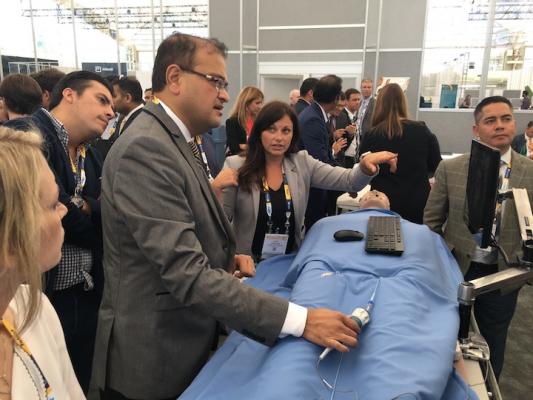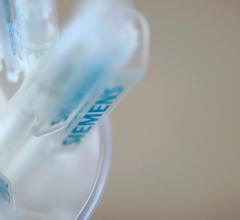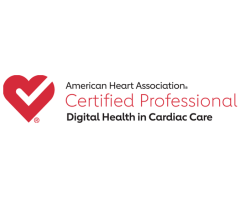
A Siemens-sponsored hands-on-training session at TCT 2018 that instructed interventional cardiologists how to use an intra-cardiac echo (ICE) catheter to image the chambers inside the heart with a catheter based ultrasound imaging system. Regular training is needed to build customer satisfaction, especially in light of regular staff turnover.
Years ago, I owned a computer that ran a spreadsheet program called Lotus 1-2-3. After about a year, I needed to perform a series of statistical analyses so I went out and spent about $150 to purchase a statistical package. Six months later, I was explaining to a friend why I needed to purchase the additional software when she looked at me and said, “You could have done all that on Lotus 1-2-3!”
This simple (and financially painful) example highlights a critical point: the importance of initial training in ongoing customer satisfaction. It was clear to me that I had no basic idea of the complete functionality of Lotus 1-2-3. As a result, I was going around getting less than the full performance that a more knowledgeable user would have experienced. Needless to say, I was not a happy camper and my satisfaction with the software suffered as a result.
Let me offer a second example. Years ago, I surveyed customers who had purchased a car from a specific high-end European automobile manufacturer. The subject of our survey was satisfaction with the sales and purchase process. We asked if they had a test drive, if they were given an explanation of the various financing options for the car and a whole other series of relevant questions. We also made two other inquiries:
1. “Before you took the vehicle you just purchased off the lot, did the sales representative explain to you the main operating features of the car?” (Yes/No)
2. “Since you have owned your vehicle, have you ever had to bring it back to the dealership to have a problem fixed?” (Yes/No)
We found that people who answered, “Yes” to the first question subsequently experienced fewer problems with their car than those who said, “No.”
Now, there are two explanations for these results. Either:
1. Good initial training can impact the performance you get from a product years after the initial purchase.
OR
2. This high-end auto company manufactured a series of vehicles with significant quality problems and shipped them to their dealers by mistake. When they realized what they had done, they immediately contacted each of their dealers and told them, “Make sure when you sell one of those defective vehicles that you provide no explanation to the customer on how the vehicle works.”
What do you think is the correct answer?
Nowhere is the importance of initial training more important than in the field of medical device sales. For one thing, these devices are becoming technologically sophisticated at an exponential rate and require highly trained technicians to operate them. Second, turnover levels among hospital staff are also increasing. This means the group that was trained six months ago can be completely different from the staff that is now using the equipment.
As with our automobile client, we find the quality of initial training can have a long-term impact on medical device performance and, ultimately, the overall level of satisfaction with the equipment. A few years ago, for example, I worked with a medical device client whose product was both extremely sophisticated AND very expensive. We surveyed decision makers at a broad range of hospitals and asked them a simple question: “After completing initial training, what was your level of confidence in the ability of your staff to effectively utilize this system for treating patients?” Respondents were given three possible response options: Highly Confident, Confident and Not Confident. We then related their answers on training to their overall level of satisfaction with our client. The exhibit below presents our results.
Over half the respondents who said that after initial training they were Highly Confident that their staff knew how to use our client’s device reported being highly satisfied on an overall basis with our client. That percentage fell to less than a quarter for respondents who were Not Confident.
These results provide insight and reveal two critical implications for medical device manufacturers:
1. Initial training forms the foundation for high levels of customer satisfaction. Make sure you get it right. A staff that knows how to use your equipment will get significantly better results from your devices than a staff that is poorly trained. It is in your self-interest to ensure the staff is properly trained.
2. Staff turnover is a fact of life. “One and done” will absolutely NOT WORK where training is concerned. As new staff join a hospital, there will be a continuing need for their ongoing education. Your account managers need to meet with the senior staff at each of the hospitals that use your equipment on a regular basis to identify new staff members who must be trained. Ignoring the need for ongoing training puts the reputation of your company and the equipment you sell at risk. The choice is yours.
The importance of initial training in the field of medical device manufacturing and sales cannot be overstated. If your product or technology are the best in the industry but you do a poor job of conveying and training on the features and benefits of your equipment, your business will be susceptible to losing sales to your more mediocre competition. Conversely, if your medical device solution doesn’t have all the bells and whistles of some of your competitors, but your team is able to demonstrate why your product is better for a particular client and how they can get the most out of it, your business will have an opportunity to grow as a result.
Editor’s note: John Larson is the senior partner at John Larson & Company, a pioneer in the field of customer loyalty and the author of the book Capturing Loyalty. Prior to starting his own firm, John held positions at McKinsey & Co., Monitor Company, Lieberman Research Worldwide, and J.D. Power and Associates, specializing in the areas of strategic analysis, organizational effectiveness, and customer satisfaction and loyalty. John uses survey research techniques to help clients develop a better understanding of the needs of their customers, assess how well these are currently being met in the market place, and then target opportunities to create long term competitive advantage. He has worked with clients to address the specific organizational barriers that can impede effective implementation.



 November 14, 2025
November 14, 2025 









